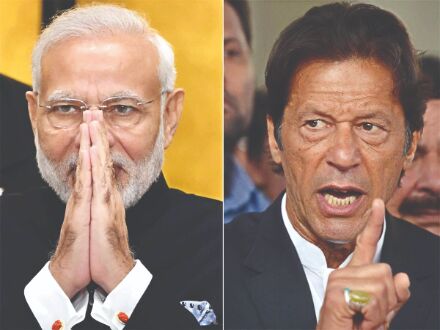India's leading edge
India’s diplomatic wins and vaccine distribution policy have been widely acknowledged in Pakistan’s academic circles while also further frustrating the Pakistani administration

India's outreach to a number of countries to supply vaccines to address the COVID-19 pandemic has augured well with a large section of Pakistani society that is talking amongst themselves about the poor production of the vaccines while their arch-rival India has risen to the occasion to deal with the problem in an effective and massive manner. Pursuing a well-crafted policy of 'neighbourhood first', India has already supplied (or is in the process of supplying) millions of doses of COVID-19 vaccines to Bangladesh, Bhutan, Nepal, Afghanistan, Maldives, Mauritius, Sri Lanka and Brazil. It's also considering supplying the vaccine to many more countries in the near future. Some senior figures of the Pakistani establishment, occupying key positions, are also overheard appreciating India and describing the supply of vaccine initiative on part of India as a major diplomatic exercise to win friends. There is no counter-argument on this as India's image has certainly got a further boost by such extraordinary gestures. India is believed to be producing 60 per cent of the world's vaccines and its pharmaceutical companies' credibility are also well known in international circles and Pakistan is silently reconciling to this fact. Neighbours of India and Pakistan, are at large, bewildered as to why Pakistan has not asked India for supply of vaccines? In all probability, India would have readily obliged its immediate neighbour as a gesture of friendship as it's an open agenda with no concealed plans. It's a humane mission to mitigate suffering. Again, unnamed friends in Pakistan assess that Pakistan lost an opportunity to seek India's help for a larger and noble cause.
Reacting, albeit belatedly, to meet the vaccine requirements within Pakistan amid growing cases of Covid-linked diseases, Pakistan has approached its all-weather ally China, which has asked Pakistan to send its aircraft to Beijing and airlift half a million doses of Covid vaccine which is a product of Sino-Pharma. Pakistan is also actively contemplating to seek consignment of around a million doses of vaccine from another Chinese pharmaceutical company, CanSino. As a gesture of goodwill, China has told Pakistan that it wouldn't charge for the vaccines, hence, they would come free of cost. It appears, China wants to appropriate this opportunity to further befriend Pakistan and also to display its "diplomatic triumph" as a signal to India which has already earned a name for timely supply of vaccines to the world in general. Chinese attempts to carve a niche same as India, however, falls short of conviction. Even a section of Pakistan's serving and retired diplomats endorse such an assessment. Earlier on February 21, Chinese Foreign Minister, Wang Yi spoke to his Pakistani counterpart, Shah Mahmood Qureshi and vowed to further reinforce the existing friendship between the two countries using supply of vaccines as a convenient opportunity towards accomplishing this mission.
Meanwhile, in another Pakistan related happening, a noted academic and research scholar, Syed Mohammad Ali, has written very recently in a prominent newspaper that Pakistan's senior politicians are wide off the mark when they refer to the present Indian Government under Prime Minister Modi as fascist. The scholar has further insinuated, rather categorically, that such labels by the politicians are indicative of Pakistan's anger and frustration with the ongoing developments in India. Interestingly and significantly, Syed Mohammad Ali has also gone to the extent of saying that describing the government as fascist is not really an accurate categorisation. The scholar's forthright and candid comments, possibly based on the RSS-related historical research by Vinay Senapati, are unlikely to escape the wrath of hawks who indulge in India bashing more to win the armed forces than for embarking on any worthy intellectual exercise. It would appear, though might be premature to judge at this stage, that there are academicians in Pakistan who have started evaluating India in all objectivity without any bias or feeling of hatred. In the recent past too, there had been a trend to challenge the prevailing governance style of Prime Minister Imran Khan, particularly on the diplomatic front and comparing the same with the slew of diplomatic victories India has scored, especially in causing a dent in the Islamic world by making inroads to Saudi Arabia, UAE and OIC, thus sharply and decidedly alienating Pakistan. This is being seen by experts as a major fallacy in Pakistan's scheme of things and often India is quoted as a good case study to emulate India's style of functioning both internally and externally. This is of course irksome to Pakistani establishment as India is brought in to illustrate Pakistan's failures in tackling major challenges. Such a trend is worth taking note of and Indians watching Pakistan may perhaps try to work out a plan to consolidate such emerging trends as part of the state craft to checkmate Pakistan.
Further, at the UN General Assembly meet on February 21, India successfully highlighted the plight of the minorities in Pakistan, especially drawing attention to the recent burning of the Hindu temple in the Kalak tehsil of Khyber Pakhtunkhwa. Pakistan tried rather half-heartedly to counter Indian arguments by citing alleged atrocities by India against its minorities. Such spats are expected to be intensified further in days to come.
The writer is a retired IPS officer, a security analyst and a former National Security Advisor to the Prime Minister of Mauritius. Views expressed are personal.



